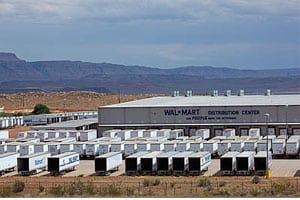 Walmart has begun asking most of its suppliers for fees to cover the costs of carrying inventory and use of its warehouses and distribution centers, in an effort to cover those costs and apply the fees more uniformly.
Walmart has begun asking most of its suppliers for fees to cover the costs of carrying inventory and use of its warehouses and distribution centers, in an effort to cover those costs and apply the fees more uniformly.
The fees cover 10,000 of the company’s 11,000 U.S. suppliers. Those exempted include providers of things like liquor and perishable items such as produce and flowers, which are treated differently by regulations.
Walmart spokesperson Molly Blakeman said the communication to suppliers covered three main areas: More closely aligning payment terms with inventory days on hand; bringing consistency to the collection of allowances related to the growth of suppliers’ business and use of Walmart’s network, including new stores, warehouses and distribution centers; and aligning allowances with rates of return on defective or unsalable merchandise.
“These types of fees are not new, but what is new is more consistently executing them across our U.S. supplier base, to drive consistency and simplicity across the terms,” Blakeman said. “We’re working with our suppliers every day to serve our shared customers, having ongoing conversations to make sure we’re delivering everyday low costs to enable our promise of everyday low prices.”
Walmart has been seeing same-store growth in recent quarters, but its earnings have been weighed down by a $1.2 billion-$1.5 billion investment in ecommerce plus $500 million to increase worker pay. This has prompted executives to signal to analysts and investors a redoubling of their efforts to rein in supply chain costs.
